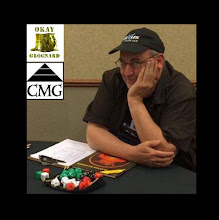The description from Board Game Geek is as follows:
Glass Road is a game that commemorates the 700-year-old tradition of glass-making in the Bavarian Forest. (Today the Glass Road is a route through the Bavarian Forest that takes visitors to many of the old glass houses and museums of that region.) You must skillfully manage your glass and brick production in order to build the right structures that help you to keep your business flowing. Cut the forest to keep the fires burning in the ovens, and spread and remove ponds, pits and groves to supply yourself with the items you need. Fifteen specialists are there at your side to carry out your orders...
The game consists of four building periods. Each player has an identical set of fifteen specialist cards, and each specialist comes with two abilities. At the beginning of each building period, each player needs to choose a hand of five specialists. If he then plays a specialist that no other player has remaining in his hand, he may use both abilities of that card; if two or more players play the same specialist, each of them may use only one of the two abilities. Exploiting the abilities of the specialists lets you collect resources, lay out new landscape tiles (e.g., ponds and pits), and build a variety of buildings. There are three types of buildings:
1. Processing buildings2. Immediate buildings with a one-time effect3. Buildings that provide bonus points at the end of the game for various accomplishments
Mastering the balance of knowing the best specialist card to play and being flexible about when you play it – together with assembling a clever combination of buildings – is the key to this game.
The rondels (resource wheels) are used similarly in this game to Ora et Labora but there are two and they each have competing elements. We immediately were intrigued with how this enhanced gameplay and it took only a little getting used to. This is one of the quickest of the Rosenberg games but doesn't feel like you only got started when it ends, as I felt with Agricola. While there is less direct interaction during play, everyone is building from the same pool of land development tiles so it can be competitive. Timing is key. Great game. One of my favorites of his games.
Mostly about card games and board games,
unless they have a decidedly wargamey feel.
unless they have a decidedly wargamey feel.
Please Like, Share, Plus, Tweet, Follow, and Comment!






No comments:
Post a Comment